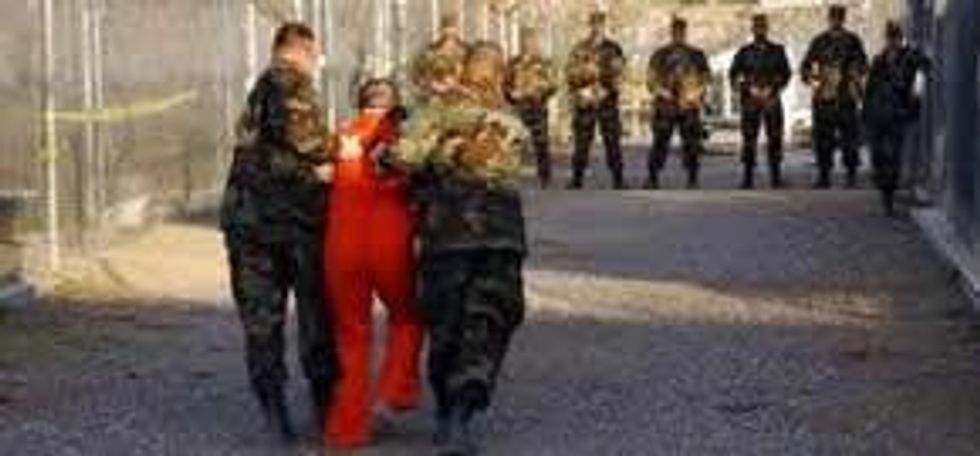U.S. citizens beware: A bill being debated on the Senate floor this week is likely to pass, and if it becomes law, you could be sent to Guantanamo Bay.
The bill is the National Defense Authorization Act, S. 1867. Section 1031 of the bill gives the President and the Armed Forces enormous power to detain people they believe were involved in the attacks of Sept. 11 or supported Al-Qaeda, the Taliban, or "associated forces that are engaged in hostilities against the United States or its coalition partners."
That section empowers the President to detain such persons indefinitely without trial or to try them before a military court or to transfer them "to the custody or control of the person's country of origin, any other foreign country, or any other foreign entity."
Sen. Mark Udall introduced an amendment to modify this section, and his amendment was voted down on Tuesday.
Sen. Rand Paul has introduced an amendment to delete this section entirely, and on Tuesday, he had the following exchange with Sen. John McCain, who is co-sponsoring the bill.
Sen. Paul: "My question would be under the provisions would it be possible that an American citizen then could be declared an enemy combatant and sent to Guantanamo Bay and detained indefinitely."
Sen. McCain: "I think that as long as that individual, no matter who they are, if they pose a threat to the security of the United States of America, should not be allowed to continue that threat."
There has been some confusion on the Internet as to whether the National Defense Authorization Act really applies to U.S. citizens. But Sen. McCain's answer should clarify that once and for all.
The confusion stems from Section 1032, which deals with the military detention of the people the Armed Forces captures "in the course of hostilities." Part of Section 1032 states: "The requirement to detain a person in military custody under this section does not extend to citizens of the United States."
Christopher Anders, senior legislative counsel of the ACLU, explains the problem.
"The exclusion on Section 1032 only applies to 1032. It doesn't apply to 1031," he says. "And that only makes it worse, because any judge is going to say, 'Of course, members of Congress meant for American citizens to be detained because if they didn't, they would have put in the exception they put in one section later.' "
Anders also noted that Sen. Lindsey Graham, a backer of the bill, has said multiple times on the Senate floor, including on Tuesday, that American citizens should be put into military detention without a lawyer.
Here's what Sen. Graham said in the Senate on Nov. 17:
"1031, the statement of authority to detain, does apply to American citizens and it designates the world as the battlefield, including the homeland."
Anders is troubled by an additional aspect of Section 1031--the part that mentions transferring someone "to the custody or control of the person's country of origin, any other foreign country, or any other foreign entity."
The implication, says Anders, is that "if you're an American citizen and were born somewhere else, you can be sent to the country where you were born, which you fled, which is out to persecute you."
I'd like to add that the way the clause is constructed--note the use of the conjunction "or"--it could mean that even a person born in the United States could be sent overseas. And what, may I ask, is a "foreign entity"? Would that include Erik Prince's new mercenary company in Abu Dhabi?
Rep. Ron Paul calls this bill "one of the most anti-liberty pieces of legislation of our lifetime." He says it's "destructive of our Constitution."
His son Sen. Rand Paul says, "There is one thing and one thing only protecting innocent Americans from being detained at will at the hands of a too-powerful state - our constitution, and the checks we put on government power. Should we err today and remove some of the most important checks on state power in the name of fighting terrorism, well, then the terrorists have won."
In Congress, at least, they are winning.
The House passed a similar bill in the spring. And the Senate is likely to pass this one.
Then it'll be up to President Obama, who has threatened to veto it--and not solely for high-minded reasons, as my colleague Elizabeth DiNovella outlined yesterday.
The ACLU is counting on Obama.
"The veto threat has to be taken seriously," says Anders. "Our expectation is the president will follow through with this."
